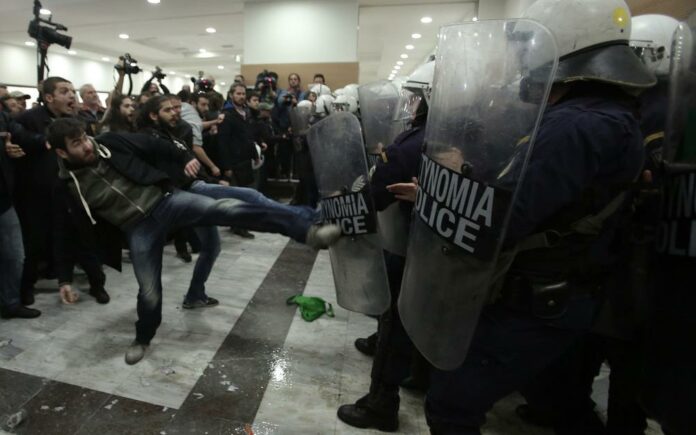A resumption of property auctions in Greece on Wednesday, along with the debut of a long-expected electronic auction platform, was greeted by another attempt by protesters to block the process.
The first two e-auctions were successfully pulled off, with no winning bidder declared in the first case – four warehouses and parking spots – while a 360-square-meter condominium with a commercial value of 780,000 euros saw the expediting bank (Eurobank) place the highest bid and purchase the property outright.
Beyond the more-or-less successful debut of the e-auction platform, 20 out of 29 courtroom auctions scheduled at the Athens local court (Eirinodikio) were conducted, with a winning bid accepted in 10 cases.
Violent protests took place at the Athens court, as protesters tried to break through a police cordon to stop the process. Riot police used tear gas and at least three protesters were reportedly injured. Members of so-called political “collectives”, ranging from anti-establishment activists to far leftwing political cadres, have long tried to prevent and even outlaw all auctions for foreclosed properties and assets in Greece by banks and the state.
In a bid to overturn a previous decision by notaries’ associations to abstain from auctions until the end of the year, the government this month promised – and delivered on Wednesday – to guarantee security at local courts and at private notaries’ offices, where auctions can also take place.
In terms of standing legal protection for a homeowner’s primary residence in Greece, income and cost of living criteria for eligibility under the so-called “Katselis Law” (3869/2010) are still in force.
Two categories of protection for primary homes are foreseen.
In the first category, a primary residence must not exceed a pricey 180,000 euros in value, the latter determined via objective tax criteria used by the state to tax property.
The threshold increases to 220,000 euros if the owner is married, with another 20,000 euros added to this sum for each underage child in the family, up to three.
At its highest level in the first category, therefore, legal protection against foreclosure and auction of a primary residence in Greece is extended for a property valued at up to 280,000 euros, assuming that the homeowner falls under specific income criteria.
In terms of the second category, the primary residence’s value cannot exceed 120,000 euros; 160,000 euros for a married homeowner and 20,000 euros additionally for each child, up to three.
A deadline for inclusion in this legal protection is Dec. 31, 2018.














